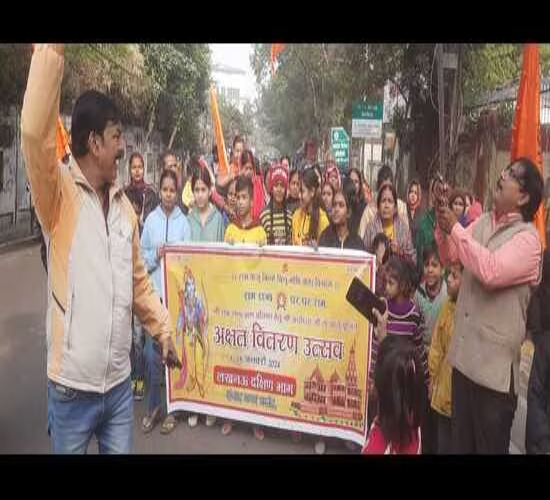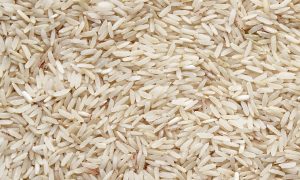VHP’s ‘rice’ initiative gathers steam, BJP looks to cash in on temple appeal

Pujit Akshat Utsav is RSS affiliate Vishva Hindu Parishad’s latest community outreach on the Ram Mandir construction
Women and children from Lucknow’s Ravidas Nagar locality clap rhythmically as they knock door-to-door, greeting commoners with ‘Jai Shri Ram’ and handing them small packets containing few grains of ‘Pujit Akshat (uncooked rice offered to the Lord)’, a photo of upcoming Ram temple that awaits grand inauguration in Ayodhya on January 22 and a pamphlet that explains the novelties of the temple.
The pamphlet is also an invitation for the commoners to visit the Lord’s grand abode but only after chartered flights carrying celebrity guests from across the globe take off from the all-new international airport, named after sage Valmiki who authored the Ramayana, the life and times of Lord Ram in his earthly avatar.
That’s ‘Pujit Akshat Utsav’— RSS affiliate Vishva Hindu Parishad’s latest community outreach on the Ram Mandir construction, an emotive issue that the ruling Bharatiya Janata Party, Sangh’s ideological fountainhead, is looking to leverage ahead of the 2024 Lok Sabha polls.
On the face of it, the ‘Pujit Akshat’ initiative—rice with turmeric considered auspicious and accompany most Hindu invites—doesn’t have an overt BJP presence but deft undertones of the party’s presence are unmissable.
For instance, the invite teams are also urging the people to light up earthen lamps at their homes and temples on January 22. During his Ayodhya visit for inauguration of the international airport and revamped railway station, Prime Minister Narendra Modi had appealed to the people to light up lamps.
“None of the people here in this ‘toli’ are from BJP. All the same, there is no bar on anyone from being part of this initiative either as all this is in the name of Lord Ram, a binding force for the whole country,” said Pankaj Jaiswal, 51, a local VHP functionary, coordinating the group of women and children part of ‘Pujit Akshat’ distribution.
However, the ruling party is also planning to come out with a booklet listing how its leaders had been involved with the temple cause for decades.
“Unlike others who become Ram Bhakts for political reasons mostly during elections, we talked about our commitment for temple even when we hardly had any political presence. That is why we say that for us Ram Mandir is a matter of commitment not politics,” said deputy chief minister Keshav Prasad Maurya.
The ‘toli’ Jaiswal was leading kept raising slogans like ‘Ek hi naara, ek hi naam, Jai Shri Ram (one slogan, one name, Jai Shri Ram) while moving around localities like Ravidas Nagar, named after a much-revered Dalit guru.
Champat Rai, the general secretary of Shri Ram Janmabhoomi Tirath Kshetra Trust, had also launched the 15-day initiative on January 1, from Ayodhya’s Balda colony, a locality dominated by Dalits, who along with OBCs were at the forefront of the Ram Temple agitation and are also part of the Sangh’s ‘unified Hindu’ campaign.
The pamphlets being distributed with the ‘Pujit Akshat’ campaign also mention that proposed to come up on the Ram Janmabhoomi campus are temples of sage Valmiki, Nishadraj, Shabri and Ahilya— Hindu icons from humble, socially disadvantaged Dalit and OBC backgrounds, the mainstays of BJP’s phenomenal wins since 2014.
So, is the ‘Pujit Akshat’ campaign centered in localities dominated by these communities? “We are targeting each door, each household. Lord Ram belongs to one and all and this is the celebration of the struggle of hundreds of years finding fruition,” said Ashok Dubey, RSS’s prant prachar pramukh, Awadh region. Babloo Awasthi, 53, a government employee associated with one of the many ‘Pujit Akshat tolis’ moving across the state, whipping up religious fervour, explained how the ‘rice’ initiative is unfolding.
“We are approaching people and inviting them to Ayodhya after temple inauguration. On the day the temple opens, we are urging the masses to offer prayers at their nearest temples because the stars are very favorable during the inauguration time and hence prayers made then would have most impact,” Awasthi said. Community feasts for commoners arriving in Ayodhya too are being lined up to ensure that the poor and commoners don’t go back hungry. “Free meals would be served for over two months as celebrations would run on well past the inauguration,” a senior VHP leader said.
















